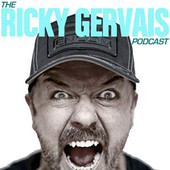Radio hosts have been into podcasting right from the beginning. They were pioneers, but until recently they have mostly used the podcasts to boost profile gained on the traditional radio airwaves. But the tables may be turning if international trends are any guide.
Paid podcasting is taking off and some of the leaders in the field are reporting the beginnings of new business models around paid podcasts, product placement and podcast spinoffs.
Ricky Gervais was one of the early adopters of podcasting and made an international name for himself on the back of the success of his cynical podcasts. While he had a reputation in the UK, it was the power of podcasts distributed via the world wide web that lifted him to international notoriety with fans.
Gervais gives away his podcasts for free, building a loyal fan base, then slices and dices the content for sale later in the iTunes Store. In the UK, where long-form radio comedy shows have always been popular, Gervais has renewed the format and is making some money from it.
In the USA, where consumers are much more ready to pay for their media than Brits or Australians, a range of broadcasters are now covering all their production costs directly from paid downloads and subscriptions.
National Public Radio, the closest thing America has to our community radio sector, has a range of programs which are funded by passionate listeners willing to pay a donation to keep their favourite shows going. One example is the modestly titled Pretty Good Podcast which reports generating up to several thousand dollars a month in revenue.
While this kind of money is chicken feed for commercial radio, there are plenty in Australian community radio who would love to initiate this business model to fund their volunteer program making. CBAA conference goers this week would do well to look to the American example to see what lessons can be learnt.
The Pretty Good Podcast program aggregates its listeners through social media and also accepts embedded advertising in its podcast talk content (see profile below). Producers report that listeners are willing to pay to feel like they are part of a club of like-minded people who are ‘in the know’ on important issues.

Other successful American paid podcasters include Heidi and Frank, who stream their live show’s podcast free, but offer the post-produced 30 minute version as a download to ‘VIP Club’ members for a subscription price of $4.95 per month.
Like radio, newspapers are considering subscription models more seriously now than ever before as they continue to lose the classified advertising ‘rivers of gold’ to internet search websites. The departure of journalist manager John Hartigan from News Limited this week, and his replacement by subscription media business expert Kim Williams is another signal of structural changes happening to the media advertising business model.
Will Aussies pay for their online media? They didn’t when Doug Mulray was ahead of him time years ago with his streaming and download online radio station, but times have changed, and many more consumers are now rushing to the internet for their media content and some are willing to pay for it. So far very few Aussie broadcasters are trying to get money from the audience for their podcasts, but this may change if audience attitudes change.
Traditional radio stations have so far supported podcasts as part of their business ‘outreach’ to keep audiences loyal, with programs such as Angela Catterns and Wendy Harmer’s non-commercial ABC Is it Just Me podcast and the hugely successful Hamish and Andy podcasts, which are also currently free.
Angela Catterns has told radioinfo:
Wendy and I recorded several seasons of the podcast Is it Just Me for the ABC local radio website, as well as It’s News to Me for the ABC NewsRadio website. More recently we recorded a series of podcasts called In the Loop for Wendy’s new website www.thehoopla.com.au
While I’d love to charge a small fee per podcast, or for a regular subscription, I don’t think people are prepared to pay for them just yet. Though as an avid podcast listener myself, I’d be happy to pay a small annual subscription fee for my favourites – Sound Opinions and This American Life on NPR. Both are free but I am so appreciative of them that I’ve made a small donation (as encouraged) to NPR.
I don’t think it’ll be long before an audience is prepared to pay for quality podcasts, via subscription or sponsorship. Listening to them is becoming habitual and a part of our lives.
One successful podcaster, Trevor Long, who produces a technology podcast, is having success so far. He has told radioinfo: “I have two podcasts I produce myelf, both are successful in terms of audiences, itunes rankings, and revenue.”
ACMA this week released its latest study of online transactions, finding for the majority of Australians, going online is the norm, and that “growth in online transacting (banking, bill payment and purchasing) is at the core of the emerging online service market.”
About 62% of adult internet users in Australia purchased goods and services online in the six months to April 2011, with convenience and price the main drivers of online shopping. Consumer confidence about making online transactions is growing, according to the study.
Perhaps the time has now come for radio to take the next step towards monetizing podcast content in a more aggressive manner. In newspapers the terminology being used to extract a payment for content is called a ‘pay wall.’ Will radio stations also begin to put pay walls around some of their content to develop new revenue models for the future? Watch this space.

